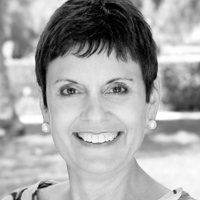Question
At what age does literacy development start?
Answer
There are many researchers including Janet Werker, Roberta Golinkoff, and others, who study early infant language development and early literacy development. Their general conclusions are that infants acquire their native languages by listening and they start life being prepared to speak. What goes into the brain is what comes out of a child's mouth. For example, if a child is speaking Spanish, what went in through their ear doorways to develop that child's brain, was Spanish. If English is coming out of the child, English went in. If clear speech is coming out, clear speech went in. If garbled speech is coming out, garbled speech went in. If the children you're working with do not have clear speech, we must always first check their input - the auditory doorways. What auditory information is getting to the brain that's compromising their spoken language output? If their spoken language output is garbled and compromised, their reading will be also. Reading is built upon spoken language, which is built upon auditory brain exposure to auditory information.
The inner ear has been fully developed for 20 weeks before birth. At birth, infants prefer their mother's speech, songs and stories heard before birth because for 20 weeks in utero the fetus' auditory brain has been stimulated with auditory information. That's how critical auditory activation and exposure are to brain health and brain development. Think about it. A premature baby is often born before its brain has had the requisite, organic enrichment and stimulation of its auditory pathways. A premature newborn needs a lot of enrichment to make up for what was missed in utero to activate their auditory brain centers. In the first six months of life, well what that means is because of hearing in utero and their mother's voice, that newborn on day one can recognize their mother's voice and prefer their mother's speech and information, their father's speech, stories that they heard in utero, that's recognizable day one. And in the first six months of life, babies can discriminate many speech sounds and vowels, consonants, and even some words, but after that first year of hearing one or two languages, that baby's brain becomes a more efficient analyzer. So the first six months, the baby is kind of a universal auditory language receiver, but by the second six months of life, that baby's brain becomes much more efficient and tuned in to the language that it hears over and over and over because it's repetition that grows and cements neural connections throughout the brain. Think about what that means. It means that organically if you want your baby to know several spoken languages, we should start introducing the brain and enriching the brain in those languages in the first six months of life when that brain is gonna be completely receptive to every single speech sound that might be available and then we give that brain practice, practice, practice, practice with the meaningful interaction using the languages that are relevant to that child's environment. Infants use phonetics, that is speech sound categories, as a basis for learning and analyzing new words and listening experience in infancy is absolutely critical for language development. Actually, that child's brain, although also holistically learning words, is analyzing phonetic categories, phonological processes, and lexical-semantic use leading to reading and higher order language use. Those first months of life are critical for laying the architectural foundation for talking, reading, and learning.
Reading is probably the most complex task humans perform because it uses so much of the brain. Speech is biologically programmed using specific parts. Children will naturally learn to speak, provided we activate their brains with meaningful, interactive, spoken communication, beginning on day one. However, reading is not natural. There are no preordained neurological areas for reading like there are for talking. For reading, we have to create neural connections. We have to have explicit instructions in the code because while humans are hardwired to talk, we are not hardwired to read. We have to create the wiring. We have to create the neurological connections between the prefrontal cortex, temporal lobe, parietal lobe, and occipital lobe, primarily in the left hemisphere. That connection has to be created through practice and intention. Reading is an exercise in neural plasticity. Literacy retrains and rewires all aspects of language in that we have to connect the areas of the brain that deal with semantics and orthography, the written part of reading, so multimodal integration and a good reader never bypass phonology. That is the sound structure of language. Skilled readers can read fast. They can sound out words in approximately 150 to 200 milliseconds. A poor reader who doesn't have their brain programmed for reading finds reading to be slow, labored, and error-prone. It can take up to 2,000 milliseconds to code a single word. How do you get better at reading? You get better at reading by reading; through practice, practice, and more practice. Good readers get better because they enjoy reading and they practice reading. Poor readers don't typically get better because reading is so laborious and they make a lot of mistakes, so they don't practice. By the time they code the second word of a sentence, they've forgotten what the first word is because they've exceeded short-term memory capacity, so therefore they do not practice.
This Ask the Expert is an edited excerpt from a course entitled, How to Grow a Young Child’s Reading Brain, by Carol Flexer, PhD, CCC-A, LSLS Cert. AVT.
